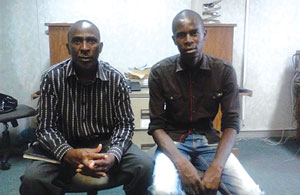
“THERE is no failure until someone admits failure.” This is true of the work by a non-governmental organisation named Bulawayo Integrated Youth Survival Alternative Project (BIYSAP) which was launched in 2010. It introduced a best schools programme at Nkayi’s Guwe High School, teaming up with community leaders to identify students who failed “O” Level examinations and taking them back to school.
REPORT BY SILAS NKALA
In an interview on Wednesday, BIYSAP’s outgoing director John Ndebele said the organisation was formed with the core objective of assisting students who did not pass their examinations and those who failed to proceed with their education because their parents or guardians did not have money for their fees.
“At the inception of the organisation in 2010, through the assistance of community leaders and villagers, we identified 13 children from the Nkayi community,” said Ndebele.
“We also identified Guwe High School as the centre where we could take the identified children to.”
Ndebele said at first the organisation would pay school fees for the children and buy books for them.
“After the children managed to impress in their ‘O’ Levels, we asked the parents to come in so that we could meet half way,” he said.
“As a result of the organisation’s dedication and efforts to assist the children whom the community and even some of their relatives regarded as hopeless failures, we are pleased to say the 13 students we identified passed their ‘A’Level examinations with the highest getting 10 points and the lowest getting 2 points.”
- Chamisa under fire over US$120K donation
- Mavhunga puts DeMbare into Chibuku quarterfinals
- Pension funds bet on Cabora Bassa oilfields
- Councils defy govt fire tender directive
Keep Reading
He said female students, Moreblessing Mhaso, (10 points), Ntuthuko Mpofu (8 points), Nompilo Bhebhe (7 points), Sikhanyiso Ncube (6 points), Ntombiyenkosi Nkomo (6 points), Mthabisi Khumalo (6 points), Philisani Ncube (6 points) and one male Tholinhlanhla Ndebele, boy (6 points).
“This has been a wonderful achievement for us as an organisation,” said Ndebele.
“Imagine someone who has been relegated to a useless person getting 10 points at ‘A’ Level. Our aim is to assist parents who have been depending on donors and empower their children with education so that they become successful people and help their parents and the community as a whole.”
Ndebele encouraged parents not to abandon their children if they fail “O” Level. He said they must take them back to school until they achieve something.
Ndebele said besides assisting children in achieving their educational goals, the organisation also gives career guidance to know students who pass examinations to choose careers they want.
“Most of the children we assist are based in rural areas and don’t know how to enrol at colleges,” said Ndebele.
“After the release of results on February 19, we met the children who passed to assist them identify the courses they want to do at colleges and universities.”
He said some of them have approached the universities to try and identify their courses of interest. Ndebele was in Bulawayo accompanying one of the students, Tholinhlanhla Ndebele, to Lupane State University offices where he wanted to choose a programme to study. Ndebele said the organisation also taught micro-enterprise skills to assist youths in the community start their own projects. He said the youths go around the community doing projects which help them sustain themselves.
“Recently, we had youths repairing desks at schools and doing gardening in the community,” said Ndebele.
“We made desks at Gwitshi Primary School and Sibanengi Secondary School. We buy the timber from a local logging company which the youths then use to make school furniture.”











